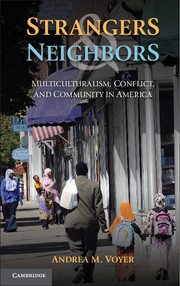Book contents
- Frontmatter
- Contents
- List of Figures and Tables
- Acknowledgments
- Introduction Strangers in a Strange Land
- 1 Ellis Island South and Maine’s Mogadishu
- 2 The Meaning of Somali Settlement and the Boundaries of Belonging
- 3 Being the Inclusive Community
- 4 Disciplined to Diversity
- 5 Familiar Strangers
- Conclusion Cultural Scaffolding
- References
- Index
- References
1 - Ellis Island South and Maine’s Mogadishu
Published online by Cambridge University Press: 05 June 2014
- Frontmatter
- Contents
- List of Figures and Tables
- Acknowledgments
- Introduction Strangers in a Strange Land
- 1 Ellis Island South and Maine’s Mogadishu
- 2 The Meaning of Somali Settlement and the Boundaries of Belonging
- 3 Being the Inclusive Community
- 4 Disciplined to Diversity
- 5 Familiar Strangers
- Conclusion Cultural Scaffolding
- References
- Index
- References
Summary
Clarkston, Georgia, lies about fifteen miles from the center of metropolitan Atlanta. With a population of about 7,000 in 2000 and estimated at 7,800 in 2010, Clarkston houses many of Metro Atlanta’s recent immigrants and immigrant service organizations. The city is nearly 7 percent Somali, 56 percent black, and 34 percent foreign-born. Approximately 41 percent of residents speak a language other than English at home – all characteristics that have earned the town the label “Ellis Island South” (Bouchard 2002b; U.S. Census Bureau 2009). The nature of Clarkston as an immigrant hub has exerted a lasting pull on some of the Somali immigrants who have settled the area since the early 1990s. However, other Somalis in Clarkston felt the strain of the high costs of living, a lack of access to educational opportunity and social services, and police harassment. Others worried that Somali culture was in jeopardy, endangered by pan-Muslim mosques in which Somalis worshipped alongside immigrants from Bosnia and Afghanistan and public schools in which parents felt children were being lost to “the lure of hip-hop music, clothes and attitudes that are so popular among African-American youth” (Bouchard 2002b, p. 1A). Those who were not satisfied turned their gaze elsewhere.
Lewiston, Maine, is 1,230 miles from Clarkston, Georgia – the trip is about thirty-two hours by Greyhound Bus, a common mode of transportation for Somali travelers. Heading north on Interstate 95, a lonely highway sign directs vehicles to Lewiston, a city sitting on the edge of the Maine woods, the largest contiguous forested area east of the Mississippi River (Sierra Club n.d.). The city center is not visible from the tree-lined exit. In February 2001, Somali immigrants began making the journey from Clarkston and its multinational immigrant population representing over fifty nations and more than 50 percent of the local population to wintry Lewiston, Maine, a regional population center with no immigrant community to speak off.
- Type
- Chapter
- Information
- Strangers and NeighborsMulticulturalism, Conflict, and Community in America, pp. 19 - 47Publisher: Cambridge University PressPrint publication year: 2013



